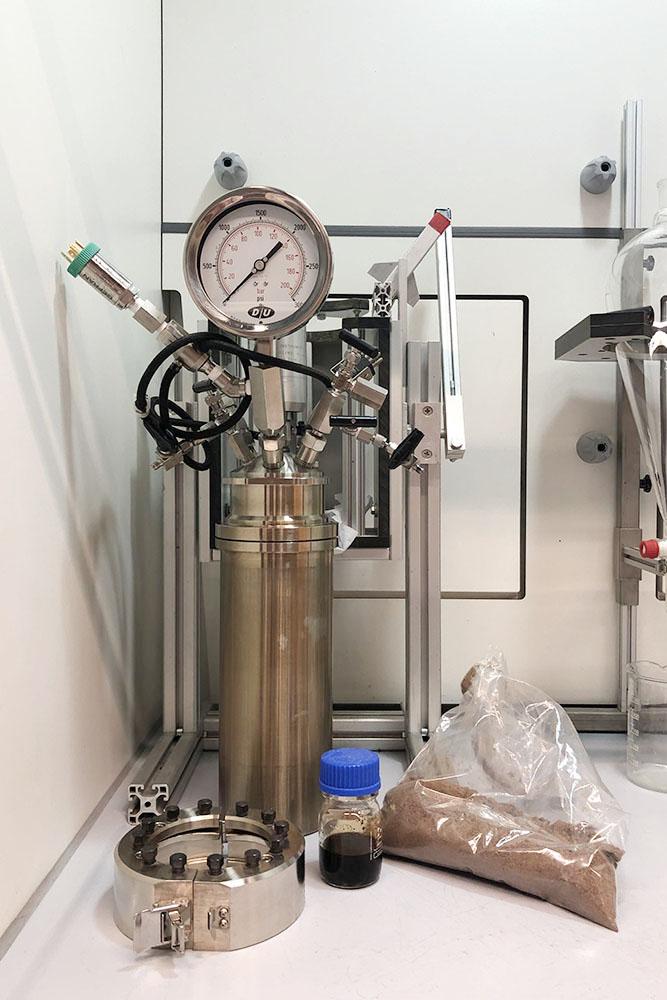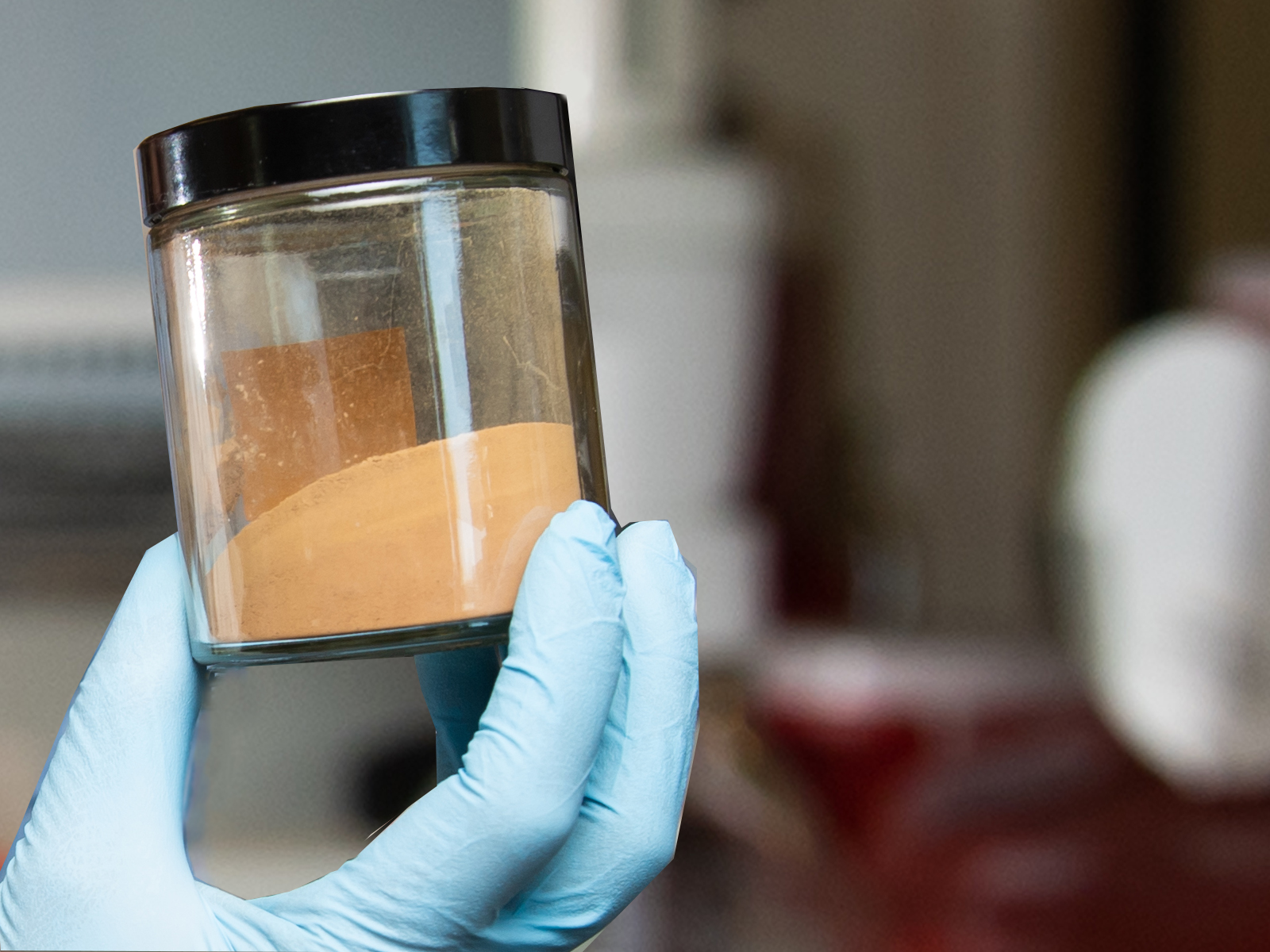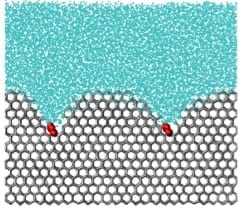HOW IT WORKS
To extract chemicals from wood, it is first split into a solid paper pulp and a liquid lignin oil using a chemical reactor (pictured here). The pulp can be used to produce second generation biofuels or natural insulation, while the lignin oil, like petroleum oil, can be further processed to manufacture chemical building blocks, such as phenol, propylene, and components to create ink. The lignin can also be used to make alternative building blocks for plastics. Chemical compounds based on lignin are less harmful to humans, compared to those made out of petroleum.
An interdisciplinary team of bioscience engineers and economists from KU Leuven has mapped out how wood could replace petroleum in the chemical industry. They not only looked at the technological requirements, but also whether that scenario would be financially viable. A shift from petroleum to wood would lead to a reduction in CO2 emissions, the researchers state in Science.
Our plastics, cleaning agents and building materials are usually made from chemical components derived from petroleum, rather than from renewable materials. Petroleum is currently cheaper to use as a raw material, but that doesn’t have to be the case. The team of researchers previously published on how wood can be transformed into chemicals that can be used in a plethora of products. That process has now been fully mapped out. Moreover, they calculated that it can be financially feasible to build and run a biorefinery that converts wood into chemical building blocks.
“In the paper industry, lignin is seen as a residual product and usually burned. That’s a pity, since just like petroleum, it can have many high quality uses if it can be properly separated from wood and the right chemical building blocks are extracted,” explains Professor Bert Sels of the Department of Microbial and Molecular Systems. As a result, wood could replace petroleum in the chemical industry.
The new publication is an important milestone in the team’s long-term research. “What’s so special about this study is that we calculated the economic viability of a switch from petroleum to wood,” says Professor Sels. To create a realistic scenario, the researchers joined forces with a Belgian-Japanese ink company. This is because certain compounds from lignin can be used to make ink. The calculations indicate that a chemical plant that uses wood as a raw material can be profitable after a few years.
CO2 storage
Through smart forest management, wood can be harvested sustainably. “Moreover, as a result of the shrinking paper industry, there is currently a surplus of wood in Europe”, Sels explains. The researchers are also collaborating with waste processors and landscape managers to use prunings and other waste wood.
Using wood-based chemicals makes it possible to store CO2 in objects like plastics.
The environmental cost of using wood would be smaller than when using petroleum, since chemical compounds made from wood cause less CO2 emissions. Moreover, products made from wood derivatives can store CO2, just like trees do. “As a result, it would be possible to store carbon from CO2 in plastics – preferably recyclable ones,” Sels said.
To demonstrate the application of their research, the team will now scale up the production process. The first test phase has already started. Ultimately, they want to create a wood biorefinery in Belgium. In the meantime, the researchers are in conversation with various business partners who can process the cellulose pulp and lignin oil in a variety of products.
“The chemical sector emits a lot of CO2 globally. A serious change is needed to achieve a carbon neutral chemistry,” says Bert Lagrain, Sustainable Chemistry Innovation Manager. “By scaling up our research project, we hope to get the industry on board.”
The Latest Updates from Bing News & Google News
Go deeper with Bing News on:
Replacing petroleum in the chemical industry
- A guide to PFAS: From what forever chemicals are to how they can hurt you
Forever chemicals are in dozens of everyday objects and even the water you drink and the air you breathe. Research shows they can be harmful to your health ...
- Oil, chemical industry lobbyists flood UN talks on cutting plastic pollution
Nearly 200 fossil fuel and chemical industry lobbyists plan to join this week's United Nations negotiations on the first global treaty to curb plastic pollution — a 37% jump from the previous ...
- Nearly 200 oil, chemical industry lobbyists plan to join UN talks in Ottawa to curb plastic pollution
Similar complaints were made about the heavy representation of fossil fuel industry lobbyists at last year’s COP28 climate change talks ... CIEL counted representatives of oil companies, chemical ...
- Engineered Bacteria: A Climate-Neutral Solution for Chemical Production
Researchers transform bacteria to produce chemicals from renewable methanol, reducing reliance on fossil fuels ...
- New technology helps US shale oil industry start to rebuild well productivity
Technology advances are making it possible for U.S. shale oil and gas companies to reverse years of productivity declines, but the related requirement to frontload costs by drilling many more wells is ...
Go deeper with Google Headlines on:
Replacing petroleum in the chemical industry
[google_news title=”” keyword=”replacing petroleum in the chemical industry” num_posts=”5″ blurb_length=”0″ show_thumb=”left”]
Go deeper with Bing News on:
How wood can be transformed into chemicals
- Thermoset plastic made from wood waste catalyzes its own degradation
Thermoset polymers have cross-linked networks that make them exceptionally tough and useful materials. But they are also practically impossible to break down or recycle. And epoxy-amine resins, one of ...
- The Best Outdoor Wood Sealers For Weather Protection
and other wood objects from water, mold, mildew, and rot. It can also prevent damage from oil, salts, and pool chemicals while being an eco-friendly option. Just load the sealer into a standard ...
- How to Recycle Wood
Untreated wood and pallets can be turned into mulch. High-quality mulch as ... Wood that is treated has chemicals to repel fungi and insects. It may include chemicals like copper, arsenic ...
- How to Apply Wood Stain
Second, it can add years of life ... That’s because the wood may contain chromated copper arsenate, a chemical that releases toxic arsenic into the air and the surrounding soil.
- 50 Wood Pallet Furniture Ideas to Build on a Budget
With a few tools the pallets can even be turned into standing planters ... do your best to ensure that the wood is clean, free of oil-based or other stains, and has not been treated with harmful ...
Go deeper with Google Headlines on:
How wood can be transformed into chemicals
[google_news title=”” keyword=”how wood can be transformed into chemicals” num_posts=”5″ blurb_length=”0″ show_thumb=”left”]











